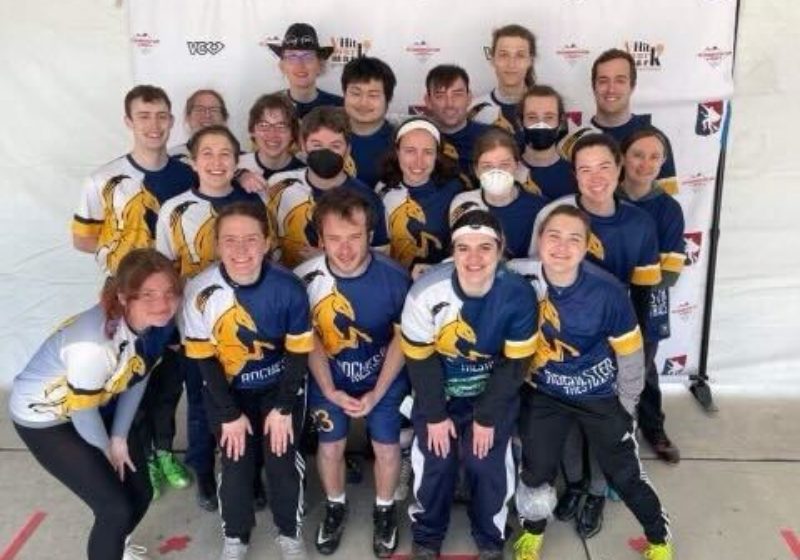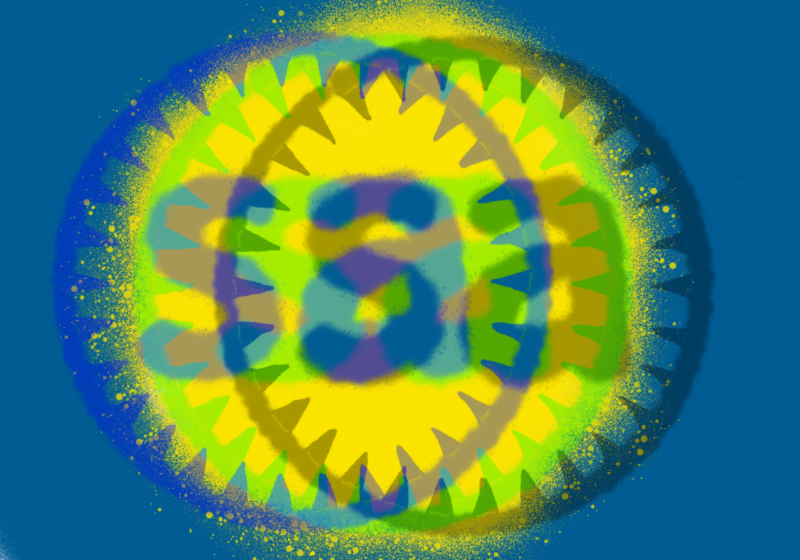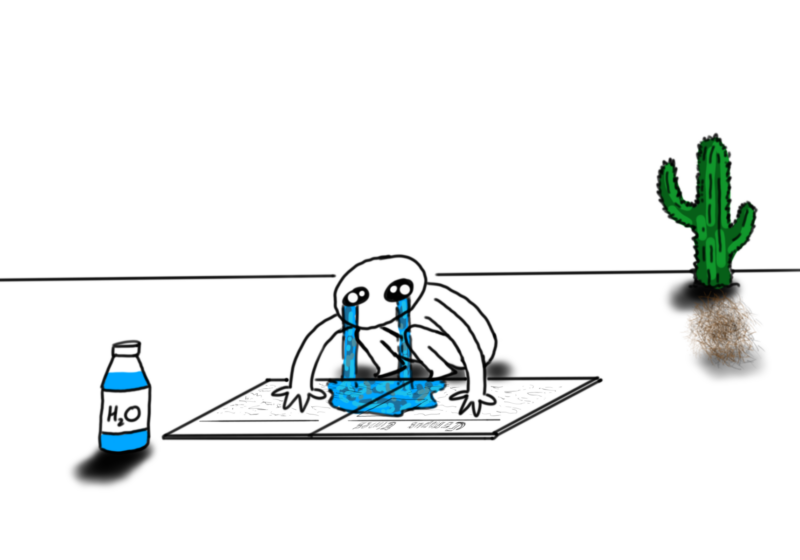The UR Thestrals, the University’s Quidditch team, recently participated in the US Quidditch Cup in Salt Lake City, Utah on April 23-24. CT interviewed Take 5 student Madeleine Fordham, along with team President and junior Rachel Zelasky on getting to Nationals with this team and how being on the Thestrals has affected their college experience.
How did Nationals go for the Thestrals?
Zelasky: On our first day, we had pool play and played three games to determine seeding for the D1 and D2 brackets. We beat Middlebury College 175–160 in a very close back-and-forth game. Next, we lost to UC Berkeley — the third ranked team in the country — 50–125, which was still incredible for our team. Finally, we lost 125–150 against Virginia Tech in yet another back-and-forth game. Our record of 1–2 got us into the D2 single-elimination bracket, where we beat the University of Northern Colorado 145–110. We finished off our competition with a 100–185 loss to Pitt in the second of back-to-back games.
What was it like to qualify for Nationals?
Zelasky: You can qualify for Nationals either by earning a bid at Regionals in the fall or by earning an at-large bid determined by rankings, which we had to fight for. Coming into the spring season, we were right at the border of receiving a bid, but we couldn’t do much about it because of COVID-19. The uncertainty was very nerve-racking, but the feeling was incredible when I saw the congratulatory email in my inbox. I immediately told the team and our group chat went crazy all day. Everyone was so excited and the energy on the team was incredibly high.
Fordham: Qualifying for Nationals was amazing. We won an at-large bid in 2020 before the Quidditch season got canceled due to COVID-19, so getting to come back and play again, under very similar circumstances, was incredible. I’m one of only five players who’ve been to Nationals before — back in 2019 — and I’m so glad I got to go with this team.
Could you give a general recap of your season?
Zelasky: In the fall, we traveled to Maryland and RIT for regular season games, then to Cincinnati for Great Lakes Regionals. We got second place at Turtle Cup in Maryland (2–1), and took some losses at RIT (0–2). At Regionals, the team fought hard and went 1–4. We weren’t able to travel in the spring prior to Nationals due to a combination of COVID-19, weather, and spring break, so the team has just been preparing for Nationals.
How did the group dynamic change in preparation for Nationals with finals around just the corner?
Zelasky: Once we earned our bid, the team began taking practices more seriously. There were definitely a lot of concerns about COVID-19 because cases were rising on campus and people were worried about getting sick before finals. We canceled practices for two weeks before Nationals to reduce risk, and we were only able to watch tapes and go over strategy in that time, which definitely took away from valuable practice time.
Was there anything you’ve taken away from Nationals that you hadn’t gotten in other competition phases, as a player, a teammate, or a captain?
Zelasky: Nationals gives us the unique opportunity to play teams from across the country and provides a much higher level of competition that really tests all the work we’ve been putting in. Additionally, we only have a few games spread throughout the weekend, so we are able to watch games (without having to referee) and meet people within the Quidditch community from all over the world. Everyone is incredibly supportive, and my favorite part of the weekend has been making connections with fellow players throughout the country.
Fordham: Nationals is unique in that you get to play a variety of teams with different styles. Any tournament is valuable because game time is so rare in this sport, but even going over to RIT or playing other Northeast teams can only show us so much. Here we’ve played from Virginia, from California, and more. You can learn so much in just a weekend.
What drew you to Quidditch and what have you gained from playing on the team?
Zelasky: Coming in as a first-year, I was planning on joining a club sport. During orientation, I went to Late Night Quidditch and was able to chat with some of the current players on the team. I immediately got a good vibe from the team so I started coming to practices. I quickly found myself immersed in a competitive, yet incredibly welcoming and supportive group. Since joining the team, I’ve gotten close with many of my teammates and truly found my place. In addition to making strong connections with some amazing people, I love getting to regularly compete at a high level in a co-ed sport.
Fordham: The people are what drew me to Quidditch. The community is fun, open, super welcoming, and helpful to new players. It’s a great mix of competitive energy and a wonderful group of friends.
What has your favorite moment on the team been thus far?
Zelasky: I loved the team’s trip to Turtle Cup in Maryland during fall break. In our first tournament of the semester we went 2–1 and were able to introduce our new players to the world of Quidditch, which is always super fun. Most of the team stayed a couple of extra days to go sightseeing in Washington D.C., and the whole weekend was a great bonding experience. We got to play Quidditch, go to museums, and even celebrate one of our teammates’ birthdays. I wouldn’t have wanted to spend my fall break doing anything else.
Fordham: My favorite moment was getting two snitch catches in this tournament! Seeking is generally a position that’s given more to guys — especially bigger guys — and to pull it off as a small, female seeker was just an incredible way to end my college quidditch career.
How did the crowdfunding go to get you to Nationals?
Zelasky: In just one week, we were able to raise over $9,000! Once we told the team the urgency of getting flights, we immediately had everyone volunteering to help in whatever way they could — whether it was making social media posts, scrounging for cans, selling merch, or getting a pie thrown in their face. The whole team really came together to pull off such an incredible feat. I won’t lie, it was incredibly stressful to coordinate such an insane campaign, but it was absolutely worth it.
What does it feel like to spearhead a team to such a high level of competition? Has it changed your view of yourself or your relationship to your team in any way?
Zelasky: As the president of the team, and a non-playing member of the team (due to long-term injuries), I’m effectively the manager of the team. Running the team can definitely be stressful at times whilst trying to coordinate eboard, manage constantly-changing schedules, and keep track of 20 players wandering around a huge athletic complex. It’s definitely taught me some great leadership skills, if nothing else. Even though I can’t play, I absolutely love watching my team grow and thrive throughout the season. Nobody comes into college knowing how to play Quidditch, so I’ve gotten to help players grow from not understanding the game to being a starting player scoring on some of the best teams in the country. Every bit of stress is worth it to know that I’ve helped lead the team to all of our accomplishments. Since assuming a leadership role, my position on the team hasn’t changed too much. If anything, I’ve just gained a lot of respect from my teammates, since they honestly don’t know what they’d do without me.







